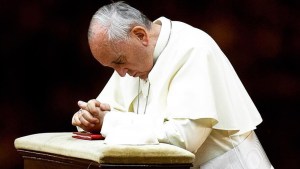Pentecost Novena, Day 7
Introductory Prayer:
Come, O Holy Spirit: enlighten my understanding in order that to know your commands; strengthen my heart against the snares of the enemy; enkindle my will … I have heard your voice, and I don’t want to harden my heart and resist, saying “later … tomorrow.” Nunc coepi! Now! Lest there be no tomorrow for me! O, Spirit of truth and wisdom, Spirit of understanding and counsel, Spirit of joy and peace! I want what you want, I want it because you want it, I want it as you want it, I want it when you want it.
Reflection:
Spiritual writer Jacques Philippe, in his book In the School of the Holy Spirit, includes this reflection from St. Francis de Sales, on discerning if an inspiration comes from the Holy Spirit:
One of the best signs of the goodness of inspirations in general, and particularly of extraordinary ones, is peace and tranquility in the heart that receives them: for though indeed the Holy Spirit is violent, yet his violence is gentle, sweet and peaceful. He comes as a mighty wind [Acts 2:2] and as heavenly thunder, but he does not knock the Apostles down, he does not upset them; the fear they had in hearing the sound was momentary, and was immediately followed by sweet assurance …
Closing Prayer:
Holy and divine Spirit! Through the intercession of the Blessed Virgin Mary, your Spouse, bring the fullness of your gifts into our hearts. Comforted and strengthened by you, may we live according to your will and may we die praising your infinite mercy. Through Christ our Lord. Amen.
These prayers are taken from the Holy Spirit devotion of St. Josemaria

Read more:
Pope Francis’ 8-step guide to discernment
According to St. Luke, Jesus ascended into heaven after “appearing to [the apostles] during forty days” (Acts 1:3) after his Resurrection. This means that the time between Jesus’ ascension and the coming of the Holy Spirit at Pentecost is nine days (not including the day of Jesus’ ascension). Many Christians through the ages have seen these nine days of prayer as a model, and thus developed devotions that consist of nine days (or months, or even hours) of prayer for a specific intention or to a particular saint. This number was seen as divinely inspired and so “novenas” (from the Latin word, novem, meaning “nine”), were viewed as a uniquely powerful way to pray.

